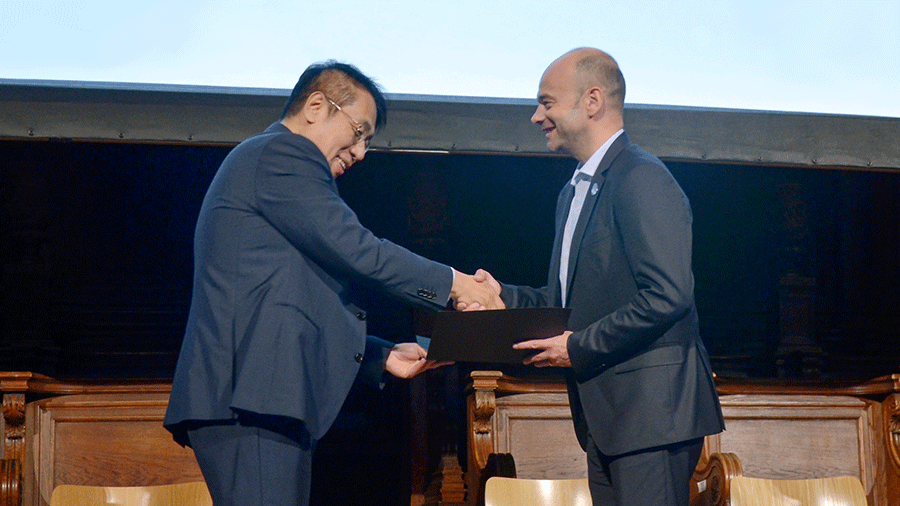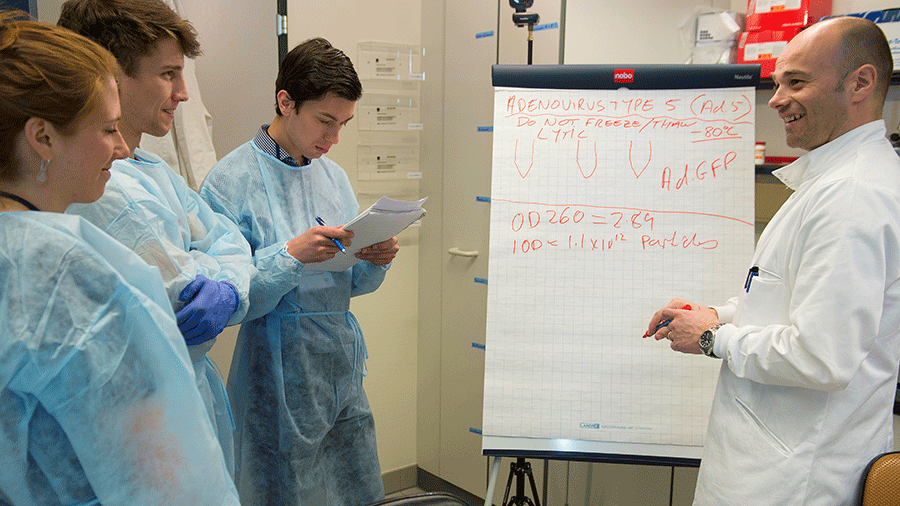ARI Program Leader Martin Stoddart receives prestigious honor from the International Combined Orthopaedic Research Societies

Martin Stoddart, program leader for Regenerative Orthopaedics at the AO Research Institute Davos (ARI), was recently inducted as an International Combined Orthopaedic Research Societies (ICORS) Fellow of International Orthopaedic Research (FIOR). The ICORS FIOR nomination recognizes an individual's exceptional professional standing and achievements in the field of orthopedic research and their status as accomplished role models for their peers. "It's quite an honor to be recognized this way," Stoddart says. "It's nice to see that people have noticed I've been quite busy with orthopedic research."
Busy is an understatement: Stoddart completed his bachelor's studies in biology at the University of Aberystwyth, Wales, then joined ARI for one year in 1995 while finishing his master's in cartilage biology. In 2000, he completed his doctoral thesis at the University of Nottingham in cancer angiogenesis and went to Zurich, where he worked as a postdoc and group head in their Laboratory for Experimental Cartilage Research, which was part of the Hirslanden Group. Before returning to ARI in 2005, Stoddart spent six months at Harvard Medical School learning viral gene transfer techniques with Brigham and Women's Hospital in Boston. In 2020, Stoddart began leading ARI's Regenerative Orthopaedics Program while also running the institute's Progenitor Cell Biology and Mechanoregulation Focus Area.
Stoddart's list of publications is extensive: he has authored more than 150 scientific papers and book chapters, he is the editor of three books, and is an editor for Frontiers in Bioengineering and Biotechnology and BioMed Research International Orthopedics, as well as the eCM Journal (European Cells and Materials), the AO's open-access publication dedicated to preclinical research in the musculoskeletal field. In addition, he organizes the annual eCM Conference, bringing together scientists (biologists, engineers, and material scientists), clinicians, and industry. These activities are all on top of his work leading a team of 70 researchers at ARI's Regenerative Orthopaedics Program.
Upon learning about his FIOR nomination, Stoddart's priority was to share the news with his team: "I told them, 'This is for you as well.' A lot of what I do involves the team, so when I get nominated for something, it's not just me." Stoddart believes his nomination gives his colleagues perspective on the importance of ARI's work. "It shows the team the international recognition and esteem of the research carried out at the AO."
The significance of ARI's work is something Stoddart encountered when he was first exposed to the institute's work in 1995—an opportunity brought to the University of Aberystwyth by another alumnus, ARI Director Geoff Richards. In his first experience at ARI, Stoddart applied his cell biology studies to the study of chondrocytes, the cells responsible for cartilage formation—work that Stoddart would return to after studying cancer and oncology in the UK and that he continues to this day.
When asked about the arc of his career as it relates to cell biology, Stoddart says, "Before, I was asking more fundamental cell biology questions. Now, I ask how we can use cell biology to help patients." In his current work as ARI's Regenerative Orthopaedics Program Leader, Stoddart tries to link questions between mechanics and biology. "At ARI, we do translational science, not basic science—complex biology concerning proteins, gene science, and complex molecular biology with a clinical question in mind."
Working with his team, Stoddart employs ARI's unique world-renowned bioreactors, including a cartilage bioreactor that he has used for the past 16 years, to answer questions posed by the projects he runs, such as how mechanical load drives cell changes and the healing process. "Each answer is like a little puzzle piece that fits into a much bigger picture," Stoddart says. And those answers, in turn, provide clinicians with substantial knowledge that translates into improved outcomes for current and future patients.
Sharing this knowledge is essential to Stoddart's work; his list of publications and conference participation is a testament to that. But, for him, excellent research alone is not enough; disseminating that work and exchanging ideas with researchers and clinicians, along with encouraging young researchers, is part and parcel of his daily work. This generous, balanced, and striving approach is why Stoddart is a newly inducted ICORS FIOR.
On September 8, 2022, Stoddart took part in an induction ceremony for elected FIORs at the ICORS World Orthopaedic Research Congress in Edinburgh, Scotland. He joins ARI staff Mauro Alini and Geoff Richards, who were previously inducted as FIORS.


